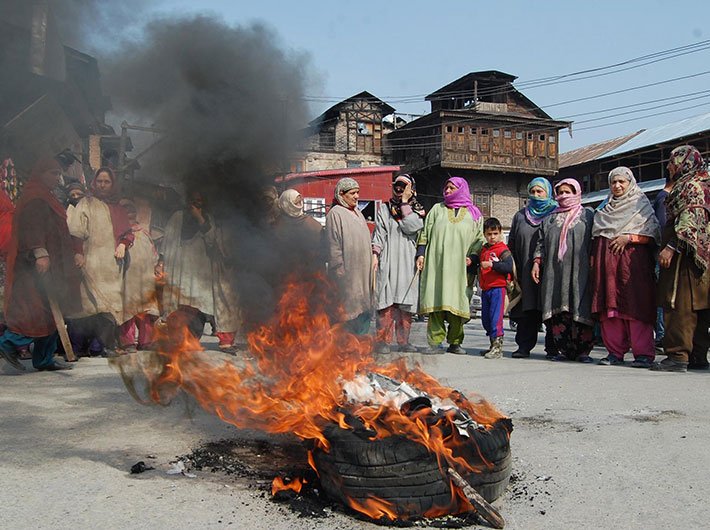Food habits coupled with PDP-NC rivalry lead to protests against NSFA implementation in J&K
In recent days, Kashmir has been seething with anger. Far from greeting the National Food Security Act (NFSA), 2013 – to be implemented in the border state from April 1 – as a safety net for the poor against hunger and malnutrition, people in the Valley are looking at it as a regime which will force them to change their food habits – from rice as a staple to a rice-wheat platter.
“We Kashmiri people are heavy rice-eaters,” says Tariq Mughal, secretary of the traders’ federation in Sopore. He says atta (wheat flour) does not fit into Kashmiris’ food habits and they find 3 kg rice (plus two kg floor) per head as very little. “This is not even in accordance with the WHO norms which say that one person should get at least 400 gm of grains per day – forget nutritional requirements, we won’t even get to fill our stomachs with this.”
Mughal recently led a protest march against the NSFA. Angry townsfolk in Tangdhar, Uri and Baramulla and in many other towns across Kashmir have also registered their protest against the law; while the separatists have called for its withdrawal. Some 15,000 people in Uri had started marching towards the line of control demanding that they be allowed to get food from across the LoC in case Delhi does not satisfy their demand for rice as against the rice-atta combine. However, army personnel deployed there prevailed upon the angry people to give up the march.
Ghats – ration shops on the banks of the Jhelum river – are closed all over the Valley in protest against the implementation of the NSFA. In fact, there is more confusion and fear and nobody is able to explain the best part of this landmark law on the state in the absence of an elected government.
Meanwhile, the man who called the extension of the NFSA to J&K a “revolutionary step” and a “game changer” is no longer around to defend it. In the December 3 cabinet meeting that turned out to be his last, chief minister Mufti Mohammad Sayeed had given a go-ahead to the extension of the NFSA in the state.
However, little did he know then that instead of being welcomed, the new PDS regime would snowball into a controversy and would leave his flustered successor – daughter Mehbooba Mufti – to defend it.
Talking about the protests, MY Tarigami, the CPM legislator from Kilgam, Kashmir, says that though the NSFA is beneficial to people as it would ensure access to grains at affordable rates to the poor people, it also lowers their entitlement of rice, which is bothering people, particularly in the Valley. “However, the fears are more notional than real and parties are also playing politics over it,” he told Governance Now over telephone.
The National Conference (NC) is clearly trying to turn this issue into a major agitation against PDP in the coming days. Mehbooba Mufti, who is understood to be toying with the idea of government formation with BJP once again, has accused the NC of evading its responsibility; first by not taking a decision on NFSA and now by carrying out a ‘disinformation campaign’.
Governor NN Vohra’s administration says that the protests are more due to the fact that a lot of people are worried about getting exposed for having bogus ration cards. “We have already cancelled 2 lakh bogus cards and had also deleted about 3.75 lakh cards of the creamy layer which included senior bureaucrats, ministers, legislators and farmers with large land holdings,” said an official.
As protests continue in Kashmir when people in Jammu and Ladakh regions are taking NSFA in their stride, analysts feel that lack of an elected government was leading to a disinformation campaign and people being misled.
“People would have to be made aware that a lot of poor people will get cheap food for Rs 2-3 per kilo as entitlement while those with means would be excluded from it,” said a political activist not willing to be named.

